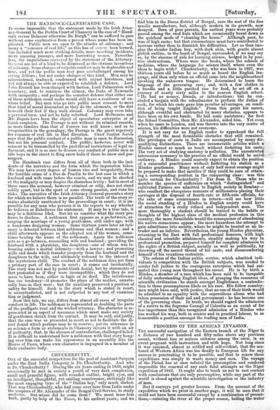CHITCKERBUTTY.
ONE of the succesful competitors for the post of Assistant-Surgeon under the East India Company is Dr. Chuekerbutty. And who is Dr. Chnekerbutty ? During the six years ending in 1850, might occasionally be met in society a youth of very dark complexion, small and graceful figure, with rounded outline, bright eyes, and an intelligent, thoughtful, vet smiling countenance, strikingly like the most engaging type ot the "Italian boy," only much darker. That was Chuckerbutty, who had come over here from India under the auspices of Mr. Alexander of the Bengal Civil Service, to study medicine. But where did he come from ? We must trace him back, partly by help of the Times, to his earliest years; and we
fiLd him in the Dacca district of Bengal, once the seat of the fine muslin manufacture, but, although modern in its growth, now decayed. Born of poor parents, his earliest years were probably passed among the reed huts which are occasionally biirnt down as the quickest mode of "cleaning the house." Although poor, he was of high caste; but that circumstance must have contributed to increase rather than to diminish his difficulties. Let us then ima- gine the slender Indian boy, with dark skin, with gentle almost girlish outline, in the heart of Bengal, surrounded, if we may say so, by the absence of aids for learning science, hedged in by posi- tive obstructions. Where were the books, where the schools of medicine where the language for science itself, where even the ideas to medicine, with? Chuokerbutty, who was born in 1827, was thirteen years old before he so much as heard the English lan- guage, and then only when an official came into the neighbourhood speaking the unknown tongue. He determined to learn the language of the governing race; and, with a few clothes in a bundle and a little parched rice for food, he set off on a journey of nearly sixty miles to the nearest English school.
He had no money, friends, or introductions; but he con- cluded a bargain with the schoolmaster to perform the duties of cook, for which his caste gave him peculiar advantages' on oondi- tion of being taught English." From this point his career, although eventful and obstructed by many obstacles, appears to have been on his own hands. He had some assistance ; for first the School Committee, then Mr. Alexander, aided him. Yet even when he came to London, and was thrown into the very centre of science, his difficulties were not overcome.
It is not easy for an English reader to apprehend the full strength of the most formidable obstacles that still remained. The privileges of caste in India are accompanied by many dis- qualifying distinctions. There are innumerable articles which a Hindoo cannot so much as touch without forfeiting his caste. The very act of studying anatomy is pollution. The unrestricted intercourse necessary to the practice of an official would be social outlawry. A. Hindoo could scarcely expect to obtain the position of a successful practitioner without forfeiting his station as a Hindoo gentleman. Many men of only half moral courage might be prepared to make that sacrifice if they could be sure of attain- ing a corresponding position in the conquering class : was this quite certain for Chuckerbutty ? Far from it. Those who re- member the species of sufferance on which "distinguished" and cultivated Parsees are admitted to English society in Bombay— who recollect the obsequious manners of millionaires placing their carriages at the disposal of fourth-rate or fifth-rate officials, for the sake of some countenance in return—will see how little the social standing of a Hindoo in English society could have of attraction for a really refined and independent man. The more thoroughly a student should be trained to the habits or thoughts of the highest class of the medical profession in this country, the more formidable would the consequence of abandoning his native connexions appear; the more hazardous the attempt to gain admittance into society, where he might be treated as an in- truder and an inferior. Nevertheless, the young "Undo° physician, returning to the East with full professional honours' with high classical and scientific attainments, steadily making his way in professional promotion, prepared himself for complete admission to the rights of a British subject, socially as well as politically, by throwing off the sacred thread of his caste, and disencumbering himself of his vexatious restraints.
The reform of the Indian public service, which admitted indi- viduals to competition with the British subjects, was needed to render full justice to the courageous enterprise which had ani- mated this young man throughout his career. He is by. birth a Hindoo, a member of a race which has been said to be incapable of fully understanding English ideas, of grasping the resources of scientific civilization : he stands amongst Englishmen a contradic- tion to those presumptuous libels on his race. His fellow country- men might have said with justice, that no one of their birth would be admitted to an equality with the supercilious aliens who had taken possession of their soil and government : he has become one of the governing class. In truth, we should regard the admission of a native to the Supreme Connell of Calcutta as an event of far less importance than this recognized admission of a Hindoo who has worked his way, both in science and in practical labour, to so honourable a position amongst the leading men of India.


























 Previous page
Previous page